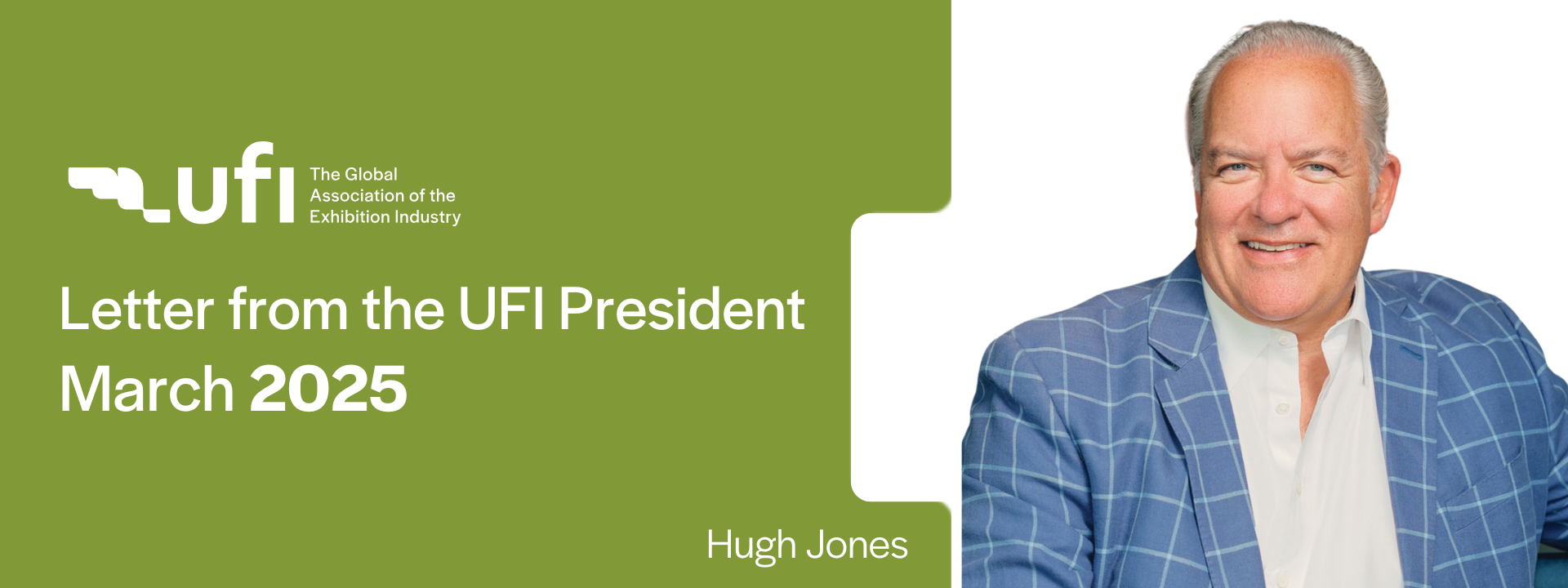
Antony Reeve-Crook, Director, ArciMedia Ltd.
When the US-Mexico-Canada trade agreement the USMCA (aka the new NAFTA) was signed earlier this year, exhibition industry observers said that it should yield financial growth and political negotiations that would complement the creation of trade shows in this part of the world. We all (according to social media at least) breathed a collective sigh of relief.
Our consternation instead returned to Trump’s foreign economic policy on the other side of the Pacific, where trade tensions and tariffs persist between the US and China, and to a lesser extent America’s second-largest creditor Japan.
These tensions have been building for a while. But rather than posts and stories about the negative impact this was having on our industry, investment and economic exploration from elsewhere appears undiminished by this macroeconomic dispute. Could it be that the companies in these countries affected by the uncertainty are seeking smaller platforms and arenas in which to do business and sign their accords for next year? And more pertinently for us, are international event organisers more important than ever in finding alternative solutions for exhibitors and buyers from the industries these tariffs affect?
Writing for The Economist in September, M&G Investments fund manager Eric Lonergan wrote that the threat of a full-blown trade war “has reduced the likelihood of global recession … it has spurred the Chinese authorities to stimulate the economy sooner than they would have otherwise”.
Investment opportunity and industry growth often arise from laborious economic and political conditions, and with its role the exhibition industry is among the first to benefit.
The opportunity for investment in China from elsewhere in the world continues unabated, regardless of an enormous falling out with its largest trading partner. Anecdotally I’ve not seen this trade war, which Trump’s Chinese counterpart (or adversary) Xi Jinping has called the largest in economic history, reduce China’s appeal to international organisers. We’ve heard as much as ever about investment in China this year, and not just from leafing through The Economist.
A huge new venue in Shenzhen, the merger of Global Sources with Clarion under Blackstone, as well as smaller-scale acquisitions such as Deutsche Messe upping its regional expansion with the Chinese Laser Fair, and the Italian Exhibitions Group inking an agreement with the organiser of Chengdu Environmental Protection Expo are just a few of the stories we’ve read.
Government-led trade agreements aren’t the only means by which we ink the foundations of industrial partnership between countries.
Tankers may run aground, but tug boats are there to keep things moving
Of course it is too early to really observe the impact this international trade wrangling is having on the formation of trade events.
However the early steps are still being made indicating more trade show activity will follow, despite the indications of this year. National trade representations bodies around the world have been busy showcasing their economic prowess through smaller, road show-type events in China and Asia as they move around in search of new revenue sources.
Recent examples include Destination Britain China and North East Asia, which VisitBritain held on 19-21 November and saw 90+ UK travel companies do business with 85 Chinese, Korean and Japanese buyers, observed by 13 members of the media in Sanya in China’s Hainan province. Another was this year’s TCEB’s Thailand CONNECT Roadshow in Japan, which reportedly (according to TCEB) drew ten events to Thailand with a projected revenue from Japan MICE travellers of THB4,848m (US$149.3m).
Small potatoes in the grand scheme of things, but writing from a nation that is soon to be cut loose from the world’s largest economic community, it’s great to see such small-scale trade missions continue uninterrupted. Their importance, particularly in the case of VisitBritain’s event, cannot be overstated.
Perhaps these organisations are feeling positive following the USMCA pact which, significantly, showed the world that Trump – who described the agreement’s forerunner as “the worst deal in the world” – is indeed capable of reaching accord.
Add to this the fact that this week began with Trump and Jinping agreeing to a temporary trade war truce on $200 billion of Chinese goods and maybe this activity is prescient, perhaps the clear benefits of globalisation will prevail. (Let’s forget for a second that tariffs remain on a total of $250bn of Chinese goods targeted since July, as do existing duties imposed in retaliation by China on $110bn of US goods.)
As this year draws to a close, and we are reminded a decade has passed since the Lehman Brothers’ bankruptcy and the subsequent global financial crash, our thoughts return to the need for prudent investment and the need to keep these conversations going.
A trade fair is a market in a bubble, so we’ve been told, and to paraphrase the authors of The Cluetrain Manifesto, Rick Levine, Christopher Locke, Doc Searls, and David Weinberger: what are markets if not conversations.







Thank you for sharing it’s really amazing post
Banquet And Restaurant in Meerut
Hotel for Birthday Party in Meerut
Wedding Venue in Meerut
Best Birthday Party Hall in Meerut
Hello,
It is a nice blog and helpful content looking benefit.
Thank you for share us
Hello,
It is a blog is benefits information is nice and helping tug board tankers is best.
Thank you for sharing with us